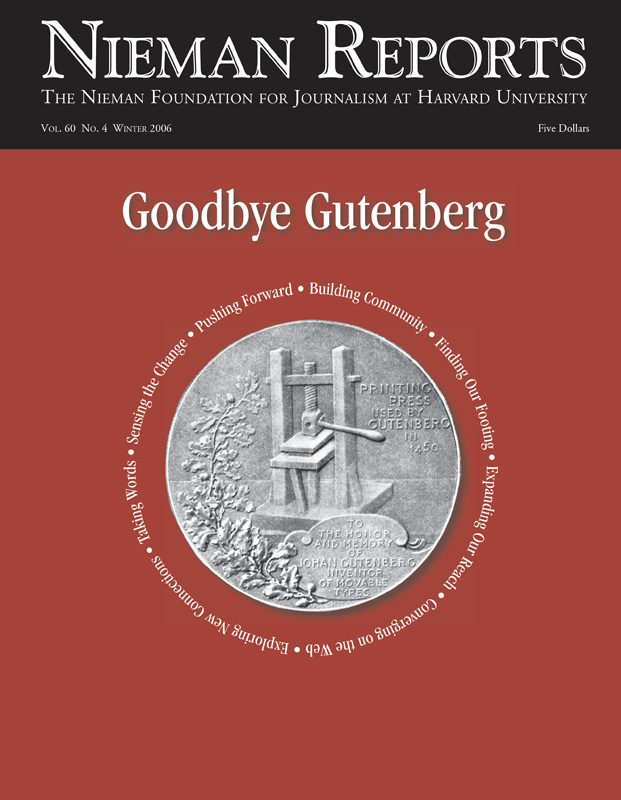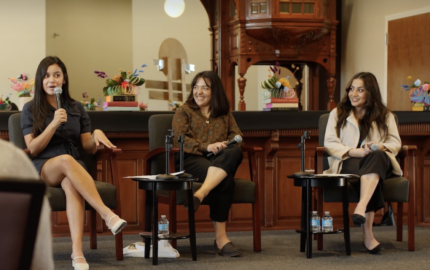
Goodbye Gutenberg
Journalism is on a fast-paced, transformative journey, its destination still unknown. That the Web and other media technologies are affecting mightily the practice of journalism is beyond dispute. Less clear is any shared vision of what the future holds.
In this issue, words about journalists' experiences in the digital era transport our vision forward, while our eye takes us on a visual voyage back to a time when newspapers wove communities together.
Editor's Note: Nieman Reports relies on journalists who write for our pages to provide an accurate account of events and experiences they share with our readers. Though we work to verify facts appearing in each article, constraints of staff and time prevent us from re-reporting elements of the story in which the author participated directly. In receiving a letter from Liz McLemore—whose work Craig Cox mentioned by name in his article—we learned how her experiences differed from the way in which Cox characterized them in the article we published. We told her that we regret any inaccuracies in the article and offered her the opportunity to have her words published in their entirety.
In an article in the Winter 2006 online edition of Nieman Reports Magazine entitled "Finding New People to Tell the Stories," Craig Cox, former editor of the Twin Cities Daily Planet, reports his experiences with an unreliable "citizen journalist" who compromised the integrity of his publication by failing to submit writing in a timely fashion. The story is pitched as a cautionary one about the inability of bloggers to "sustain their participation" in the public sphere, a thought piece about the changing role of journalism.
I'd like to introduce another "cautionary tale," but this one is about journalistic ethics. While Cox rightly points out that voluntary and unpaid journalists (such as bloggers) may not adhere to the standard of timeliness required by professional journalism, the factual inaccuracies of his article raise questions about his own professional integrity. As the blogger who failed to deliver what Cox perceives as "his" goods, I'm uniquely positioned to point out the falsehoods in his article—an article, I might add, that I stumbled across only recently on the web.
The first falsehood Cox tells is that he wrote to ask me for permission to use my writing. He reports that after reading my account of Day 1 of the trial of former Minneapolis City Council Member Dean Zimmermann, "I dashed off an e-mail to the blogger, a south Minneapolis political activist named Liz McLemore, and asked her if she would allow me to publish her courtroom chronicles for our Daily Planet readers. She was predictably flustered, curious as to why I thought her work was worth publishing, and keen to reveal her own political biases (she had worked on the campaign of the defendant's opponent in last year's election). But she eventually agreed to a deal: She would crank out her daily report on the trial, and I would grab it and post it on the Daily Planet."
In fact, Cox was sent my notes by Ken Avidor, a blogger friend who had arranged for me to post them on his website, Minneapolis Confidential. I discovered that Cox had published these "courtroom chronicles" only after Avidor had sent me a link to the Daily Planet the morning of Day 2 of the trial. Although I was delighted that Cox wanted to publish my writing, I was also a little surprised: the notes were much longer than I imagined most people reading in an online newspaper (15-20 single-spaced, typed pages each day).
However, Cox and I never had a "deal" that I would send him the notes to publish because I never dealt with Cox at all. In fact, on August 21, 2006, more than a week after the verdict was announced, I corresponded with Cox for the first time, thanking him for publishing the notes. In that email, I apologized for not getting them out sooner. Although Cox had never contacted me regarding the tardiness of my posts—and has not done so to date—I suspected that he was counting on them. (I had also received emails from disappointed friends who were anxiously awaiting each day's 15-20-page installment.) In short, I felt a responsibility to my readers, even though I was never paid for my writing nor did I promise anything to Cox.
RELATED ARTICLE
Return to Craig Cox's Article »But my case certainly points out the limits of citizen journalism: citizen journalists don't have co-workers who can take on assignments for us when we're ill or when family emergencies arise. As I explained to Cox in that email, my notes were published a day late because my family had experienced the death of not one but two relatives that week. Rather than attend the out-of-state funerals, however, I continued to arrive at the federal courthouse in Minneapolis each day and post each day's lengthy notes on Avidor's blog—albeit a day late from Day 3 until the trial's end. My failures were not the result of a lapse in what Cox calls the "necessary discipline or commitment" of a journalist, but rather due to the conditions of freelance—and free—labor. Since these were notes from a trial, I believed it was more important to get it right than it was to get it out on time. I was under no obligation to anyone, and I felt free to take my time.
As a blogger and not a journalist under any contract, that was my prerogative.
But what of Cox's own lapses in the very article in which he reports mine? Cox explains that for many people, "the media remains a monolithic, authoritarian machine that holds little interest or importance in their daily lives." Perhaps this is one reason that so many have turned to bloggers. To regain a position of importance in our lives, the media must earn it. At the very least, the public has a right to demand that professional journalists adhere to the standards of truth, accuracy, objectivity, impartiality, and fairness. I expect nothing less from Craig Cox. Too bad he has failed to deliver it.
Liz McLemore
Minneapolis, Minnesota
In an article in the Winter 2006 online edition of Nieman Reports Magazine entitled "Finding New People to Tell the Stories," Craig Cox, former editor of the Twin Cities Daily Planet, reports his experiences with an unreliable "citizen journalist" who compromised the integrity of his publication by failing to submit writing in a timely fashion. The story is pitched as a cautionary one about the inability of bloggers to "sustain their participation" in the public sphere, a thought piece about the changing role of journalism.
I'd like to introduce another "cautionary tale," but this one is about journalistic ethics. While Cox rightly points out that voluntary and unpaid journalists (such as bloggers) may not adhere to the standard of timeliness required by professional journalism, the factual inaccuracies of his article raise questions about his own professional integrity. As the blogger who failed to deliver what Cox perceives as "his" goods, I'm uniquely positioned to point out the falsehoods in his article—an article, I might add, that I stumbled across only recently on the web.
The first falsehood Cox tells is that he wrote to ask me for permission to use my writing. He reports that after reading my account of Day 1 of the trial of former Minneapolis City Council Member Dean Zimmermann, "I dashed off an e-mail to the blogger, a south Minneapolis political activist named Liz McLemore, and asked her if she would allow me to publish her courtroom chronicles for our Daily Planet readers. She was predictably flustered, curious as to why I thought her work was worth publishing, and keen to reveal her own political biases (she had worked on the campaign of the defendant's opponent in last year's election). But she eventually agreed to a deal: She would crank out her daily report on the trial, and I would grab it and post it on the Daily Planet."
In fact, Cox was sent my notes by Ken Avidor, a blogger friend who had arranged for me to post them on his website, Minneapolis Confidential. I discovered that Cox had published these "courtroom chronicles" only after Avidor had sent me a link to the Daily Planet the morning of Day 2 of the trial. Although I was delighted that Cox wanted to publish my writing, I was also a little surprised: the notes were much longer than I imagined most people reading in an online newspaper (15-20 single-spaced, typed pages each day).
However, Cox and I never had a "deal" that I would send him the notes to publish because I never dealt with Cox at all. In fact, on August 21, 2006, more than a week after the verdict was announced, I corresponded with Cox for the first time, thanking him for publishing the notes. In that email, I apologized for not getting them out sooner. Although Cox had never contacted me regarding the tardiness of my posts—and has not done so to date—I suspected that he was counting on them. (I had also received emails from disappointed friends who were anxiously awaiting each day's 15-20-page installment.) In short, I felt a responsibility to my readers, even though I was never paid for my writing nor did I promise anything to Cox.
RELATED ARTICLE
Return to Craig Cox's Article »But my case certainly points out the limits of citizen journalism: citizen journalists don't have co-workers who can take on assignments for us when we're ill or when family emergencies arise. As I explained to Cox in that email, my notes were published a day late because my family had experienced the death of not one but two relatives that week. Rather than attend the out-of-state funerals, however, I continued to arrive at the federal courthouse in Minneapolis each day and post each day's lengthy notes on Avidor's blog—albeit a day late from Day 3 until the trial's end. My failures were not the result of a lapse in what Cox calls the "necessary discipline or commitment" of a journalist, but rather due to the conditions of freelance—and free—labor. Since these were notes from a trial, I believed it was more important to get it right than it was to get it out on time. I was under no obligation to anyone, and I felt free to take my time.
As a blogger and not a journalist under any contract, that was my prerogative.
But what of Cox's own lapses in the very article in which he reports mine? Cox explains that for many people, "the media remains a monolithic, authoritarian machine that holds little interest or importance in their daily lives." Perhaps this is one reason that so many have turned to bloggers. To regain a position of importance in our lives, the media must earn it. At the very least, the public has a right to demand that professional journalists adhere to the standards of truth, accuracy, objectivity, impartiality, and fairness. I expect nothing less from Craig Cox. Too bad he has failed to deliver it.
Liz McLemore
Minneapolis, Minnesota


